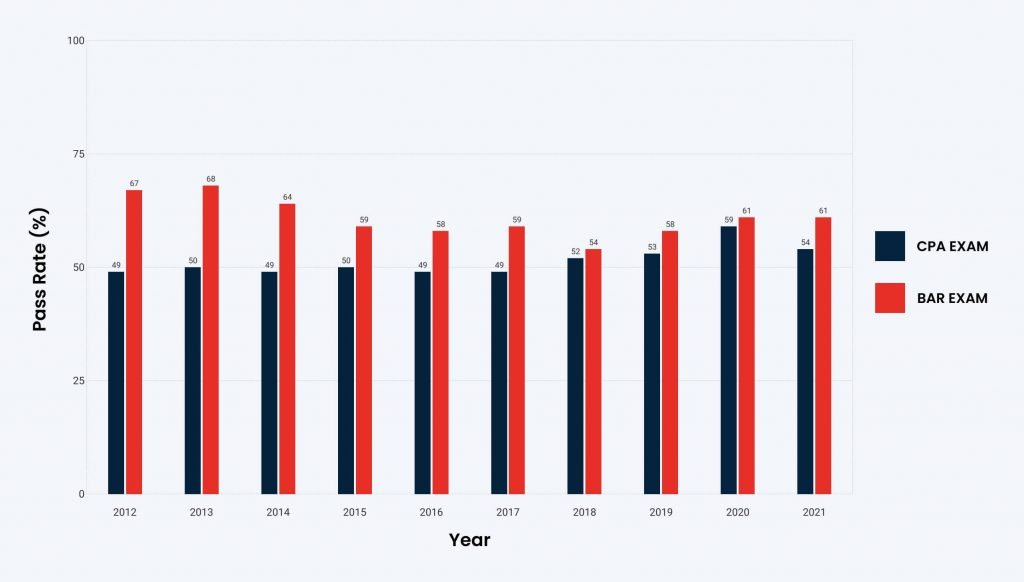New! Amazing Self-Paced Courses You Can Start Every Month!
Both the CPA exams and Bar exam are known for their difficulty and there are some disagreements as to which is really tougher and why. Below, we will provide some basic information as to what they entail, preparation and other factors that might make the exams easier and harder in some respects.
The Uniform CPA exam is a standardized exam for US accountants comprising of four parts. Once all sections have been passed with at least 75%, the applicant will qualify to apply for licensure as a Certified Public Account (CPA) within the state or jurisdiction in which they took the exam. This means that once they have met the experience, ethics exam and 150 College Credit requirements necessary for CPA licensure, they will be able to receive their license and practice public accountancy in the issuing state or jurisdiction. The license itself is issued by the American Institute of Certified Public Accountants (AICPA.) Although the prerequisites differ from state to state, the exam remains the same, in order to ensure a set standard for public accountancy across the US.
A bar exam is the final exam that must be passed before a lawyer can enter the legal bar of a particular jurisdiction. Each country or state has its own bar which is responsible for supervising its members and ensuring that they are sufficiently knowledgeable of that particular country or states set of laws and acts. As with the CPA exam, passing the Bar exam is not the only requirement to apply for licensure. These include a law degree and experience, although in the case of a lawyer, the Bar exam can only be sat once the degree and experience requirements have been met. Once the Bar exam has been passed, the applicant can apply to be registered with the supreme count in their jurisdiction and they will be licensed as a barrister or solicitor, depending on the jurisdiction. In many jurisdictions, the barrister will still need to complete further requirements before they will be permitted to practice unrestricted. When they are fully admitted to practice law, they are known as an ‘attorney.’
As always, this isn’t an easy question to answer, as there are many factors involved. Below, we have taken an average pass rate for all four parts of the exam, across all four quarters of each year, as well as the annual average pass rate of the MBE Bar exam across all states. Although this is not an entirely accurate comparison of the CPA exam and Bar exam pass rates, it is the closest we could get given that each state has its own set of exam parts, with MBE being the only section that is required by the vast majority of states.

Based on these findings alone, it would certainly seem that passing the CPA exam is consistently harder than passing the Bar exam.
However, there are other factors involved, such as the fact that Law Degrees are specifically structured to prepare the law students for the Bar exam, which makes sense since the Bar exam is a fixed requirement for practicing law. On the other hand, college Accountancy courses tend to be broader, therefore leaving graduates needing more preparation and study time before they are ready to take the CPA exam. So, there is room to argue that if an accountant can pass the CPA exam largely through self-study, then it may not be as difficult as the pass rates indicate.
In this table, we will be focusing on the US Bar exams in general, rather than the global standards.
| CPA | Bar |
| Standardized CPA exam across all states and jurisdictions | Most states and jurisdictions use some examination component created by the National Conference of Bar Examiners (NCBE). For instance, all but two jurisdictions include part of the NCBE’s Multistate Bar Examination (MBE) as part of their exam process. Some states use completely their own examination process |
| Administered throughout the year | Generally administered twice a year, namely in February and July |
| 4 parts to be passed within an 18-month timespan | Usually 3 parts over 2-3 consecutive days |
| Allows for the license holder to practice public accountancy. Without the license, an accountant can still practice as private accountancy. | An individual cannot practice law without passing that state’s bar exam. |
| It usually takes 6-7 years, including college, to become a CPA | Including college, it takes around 7 ½ years to become a lawyer |
| $7,000-$25,000 per year of college | $26,264-$60,293 per year of college |
| CPA review courses cost between $1,000 – $3,000 | Bar review courses cost between $1,500-$4,000 |
| Recommended 2-3 months per part at 10-20hours per week | 8-10 week course at 40 hours per week recommended preparation for exam |
| 2021 average pass rate 47.98-61.94% per section | 2017 63.95-86.9% on average (one state had 20.25%) pass rate |
| CPA exam costs between $1,174-$4,400 | Registering for the exam costs between $100-$1,300 |
This is really a question that you should be answering yourself after discussing it with professionals in both fields, as well as any advisors you might know. But there are some factors you could think about as well: